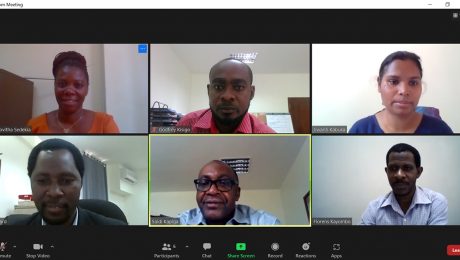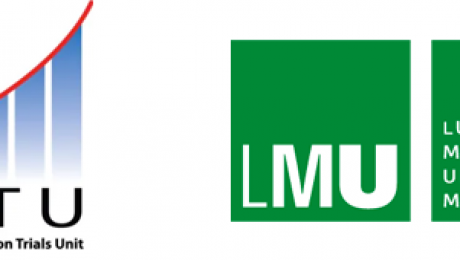
The COVID-19 pandemic has brought a radical shift in the work environment, resulting in increased number of people around the world working from home or other locations away from their official work space.

 MITU did not lag behind in protecting its staff from the spread of the pandemic and allowed a vast majority of staff to work from home. Fortunately, the technology and the available ICT infrastructure at the Unit supported this move and helped the remote working staff remain connected and productive.
MITU did not lag behind in protecting its staff from the spread of the pandemic and allowed a vast majority of staff to work from home. Fortunately, the technology and the available ICT infrastructure at the Unit supported this move and helped the remote working staff remain connected and productive.
MITU is connected through fibre internet – a broadband connection that uses fibre-optic technology to provide fastest speeds data over greater distances without major lag time. With such infrastructure in place, staff are connecting to box drive (a cloud storage service) with ease enabling them to share documents remotely from anywhere anytime. With laptop computers, USB speakerphones, headphones and the internet, staff have been able to stay connected and maintain workflow continuity and conduct live meetings and presentations using Zoom – a video conferencing web platform.
With a virtual private network (VPN) connection – a secure tunnelling technology, staff have been able to securely access the Unit’s local resources from the unsecure public internet by connecting from outside MITU. Remote support tools have also enabled the IT technicians gain access to the remote laptops used by staff working from home and provide technical support in cases of need.
The COVID-19 pandemic has unleashed the new ways in which ICT could support remote working arrangements and allow organizations to remain productive during these challenging times.
Mshana G, Peter E, Malibwa D, Aloyce D, Kapiga S, Stöckl H
ScienceDirect,2021 Nov 26
DOI: https://doi.org/10.1016/j.socscimed.2021.114606
PMID: 34861570
Adolescent health series Alcohol, Tobacco and Other Drug Use among Adolescents in Sub-Saharan Africa: a Narrative Review.
Morojele NK, Ramsoomar L, Dumbili EW, Kapiga S.
Trop Med Int Health. 2021 Oct 12.
DOI:10.1111/tmi.13687
PMID: 34637175
Today, both for-profit and non-profit organisations have recognised the value of collaborations. Collaboration among researchers ensures that their knowledge, skills, and techniques are shared, and this could benefit people who participate in the research. The more researchers collaborate, the greater are the chances for success in finding solutions for major global health problems.

In line with its mandate, MITU collaborates closely with a number of local, regional and internationally leading research and academic institutions. The most recent collaboration is with Ludwig-Maximilians-Universität (LMU) Munich in Germany. This collaboration was initiated by Prof Heidi Stöckl who recently moved to LMU, together with her ongoing collaborative research projects with MITU, after twelve years of service at the London School of Hygiene and Tropical Medicine (LSHTM).
This move has created an opportunity for MITU to collaborate with LMU in an ongoing longitudinal study on intimate partner violence in Mwanza, Tanzania. Prof Stöckl and Dr Gerry Mshana at MITU are leading this research. Prof Stöckl said this research ‘’is one of the few longitudinal studies that can investigate change in intimate partner violence and its risk and protective factors over time, therefore providing crucial information on how to prevent this form of violence against women in low and middle income countries. At the same time, our cross-sectional survey of young men is quite crucial in this field, where little is known about young men and the reasons for perpetrating violence or experiencing violence themselves’’.
While this new collaboration is currently focused on completing the ongoing research study, more collaborative opportunities between the two institutions are expected in the future
Women’s understanding of economic abuse in North-Western Tanzania.
Serpa Pimentel A, Mshana G, Aloyce D, Peter E, Mchome Z, Malibwa D, Dwarumpudi A, Kapiga S, Stöckl H.
Womens Health (Lond). 2021 Jan-Dec;17:17455065211042180.
DOI: 10.1177/17455065211042180.
PMID: 34494913;
PMCID: PMC8436308.
Studies have shown that high blood pressure (BP) among children and adolescents is relatively common, although only a few have been conducted in Africa. Scientists from the Mwanza Intervention Trials Unit (MITU) recently published a report in the journal of Scientific Report – Nature which shows that adolescents with high BP in Tanzania can be identified in school settings and linked to routine health care services. This study was conducted in 2018 among 500 students aged between 11-15 years from three public secondary schools within Mwanza city.

Introducing the study to the students in one of the participating schools

Introducing the study to the student’s parents/guardians and requesting for their consent
Dr Mussa Kelvin Nsanya – a researcher at MITU and the study lead author – said that, “Adolescents with high BP in Africa can be identified using multiple BP measurements taken at multiple steps in a span of days to months followed by a 24-hour BP monitoring for confirmation. In addition, schools could save as an effective platform for screening of high BP and raising awareness to cardiovascular diseases”.

Taking BP measurements from one of the study participants in a secure and quiet improvised cubicle at a school setting.
Findings from this study showed that 50 out of 500 adolescents (10%) had sustained high BP on repeating BP measurements at three different occasions. Using BP measurements taken over 24 hours, investigators of this study confirmed that 13 (2.6%) adolescents had high BP. MITU scientists are continuing to follow-up participants enrolled in this study in order to identify those with high BP and examine factors related to long-term changes in BP measurements.
The health of adolescents in sub-Saharan Africa: Challenges and opportunities.
Ross DA, Mshana G, Guthold R.
Trop Med Int Health. 2021 Jul 16.
DOI: 10.1111/tmi.13655.
PMID: 34270838.
A cluster randomised controlled trial to evaluate the impact of a gender transformative intervention on intimate partner violence against women in newly formed neighbourhood groups in Tanzania.
Harvey S, Abramsky T, Mshana G, Hansen CH, Mtolela GJ, Madaha F, Hashim R, Kapinga I, Watts C, Lees S, Kapiga S.
BMJ Glob Health. 2021 Jul;6(7):e004555.
DOI: 10.1136/bmjgh-2020-004555.
PMID: 34301673
Religious Leaders as Trusted Messengers in Combatting Hypertension in Rural Tanzanian Communities.
Lambert VJ, Kisigo GA, Nzali A, Laizer E, Paul N, Walshe L, Kalokola F, Okello ES, Sundararajan R, Mwakisole AH, Downs JA, Peck RN.
Am J Hypertens. 2021 May 22:hpab080.
DOI: 10.1093/ajh/hpab080
PMID: 34022044.
Bullington BW, Klemperer K, Mages K, Chalem A, Mazigo HD, Changalucha J, Kapiga S, Wright PF, Yazdanbakhsh MM, Downs JA.
PLoS Pathog. 2021 May; 17(5): e1009555. Published online 2021 May 20.
DOI: 10.1371/journal.ppat.1009555.
PMCID: PMC8172021






